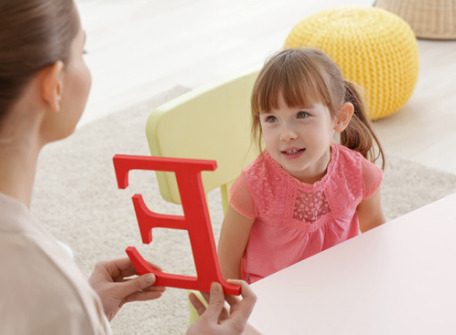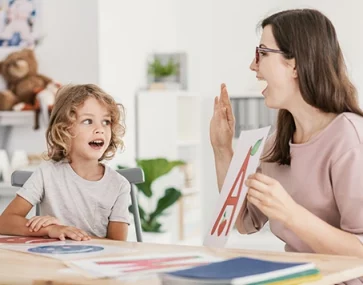Autism Spectrum Disorder(ASD) is most commonly identified in early childhood, while communication abilities are still developing. To varying degrees, ASD makes it difficult for children to communicate. Some children may be unable to communicate at all or have limited speaking ability, while others may be able to speak in great depth about specialised topics.
Children with ASD may have trouble learning language skills and understanding what others say to them. They also struggle with nonverbal communication, such as hand movements, eye contact, and facial emotions.
Speech therapy can help children with autism speech development to improve their spoken language, enhance nonverbal skills, or learn to communicate in new ways.
What Is The Cause Of Autism In Children?
Researchers are still trying to figure out what causes autism. They do, however, have a better knowledge of some of the elements that may be at play.
- Age of the parents- Autism is more likely to occur in children born to older parents
- Risk of prenatal exposure- Environmental pollutants and heavy metal exposure during pregnancy could play a role.
- History of the Family- Autism is more likely to occur in children who have an autistic close family member.
- Disorders and genetic mutation- Both Fragile X syndrome and tuberous sclerosis are linked to an increased risk of autism.
- The delivery of a child too soon- Low birth weight children are more likely to acquire the disorder.
- Unbalances in chemical and metabolic processes- A breakdown in hormones or chemicals could obstruct brain growth, resulting in alterations in brain regions linked to autism.
What Are The Signs And Symptoms Of Nonverbal Autism?
Nonverbal autism is a type of autism in which the individual does not learn to communicate. According to estimates, 25% to 50% of children with autism spectrum disorder (ASD) never acquire spoken language beyond a few words or utterances.
- The inability to talk coherently or without interruption is the most common characteristic of non-speaking autism.
- Autistic children may have difficulties initiating or maintaining a conversation with others, whereas non-speaking autistic people do not speak at all.
- This is due to a number of factors. It could be due to their apraxia of speech, a condition that impairs particular brain connections. It can make it difficult for a child to express himself clearly.
- It’s also possible that it’s due to a lack of vocal communication abilities. As the symptoms of the illness increase and become more visible, some children may lose their ability to communicate verbally.
- Echolalia is a condition in which autistic children repeat words or phrases over and again. It can be challenging to communicate.
Is Pediatric Speech Therapy Effective for Children with Autism?
Children with autism can benefit from pediatric speech therapy in Dubai in a variety of ways. Working with a speech-language pathologist (SLP) can assist evaluate if a kid has a social communication impairment and which therapy is appropriate for them.
Children can benefit from speech therapy in the following ways:
- Match the pictures to their descriptions.
- Muscles of the mouth and jaw are strengthened.
- Improve articulation and clarity of speech
- Learn to employ AAC, such as writing or sign language, to control the voice tone.
- Improve knowledge of facial expressions and body language.
- Improve social skills in a variety of settings, including at home, school, and in the community.
- Adapt to the obstacles of feeding
- Improve self-sufficiency and self-advocacy
What is Prompt Speech Therapy?
Prompts for Restructuring Oral Muscular Phonetic Targets is the acronym for Prompts for Restructuring Oral Muscular Phonetic Targets. It’s a tactile-kinesthetic method of speech treatment in which the speech-language pathologist employs touch signals on the child’s face (vocal folds, jaw, lips, tongue) to support and mould proper articulator movement. This prompt speech therapy in Dubai is provided at Hope AMC by Prompt-trained and experienced therapists.
Speech-language pathologists (SLPs) can assist children with ASD in increasing social acceptance by helping them learn to speak and communicate and also changing social communication and behaviours. To provide better care, SLPs cooperate with other professionals or the patient’s loved ones at Hope AMC, to build and implement individualised treatment plans.
Conclusion
If this is the situation with your child, get professional aid for an accurate diagnosis. Contact the expert therapists at Hope AMC. We will provide the best possible speech therapy to children with autism and help them learn to speak.
Click here to make an appointment.



